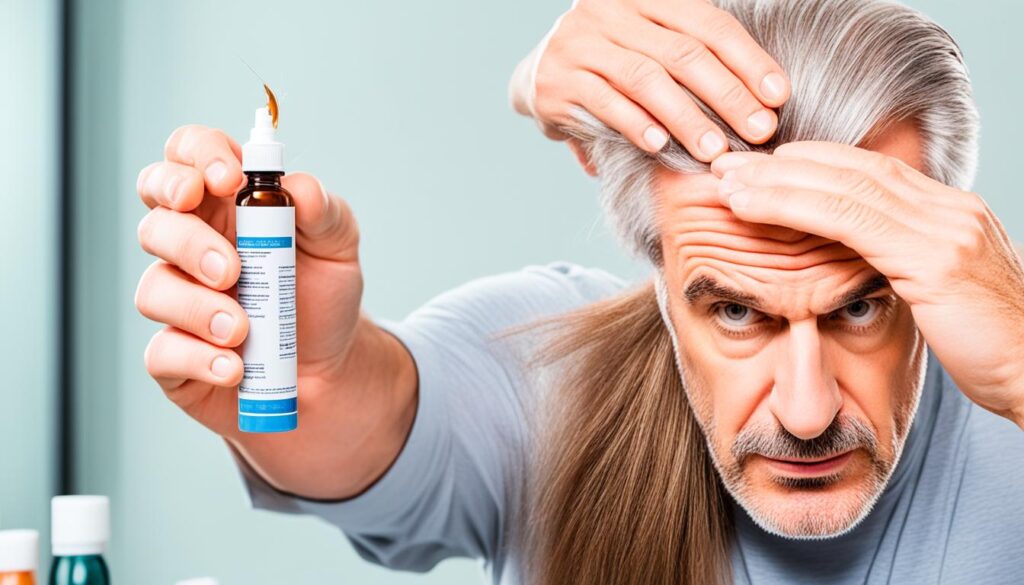Welcome to our comprehensive guide on the relationship between birth control pills and hair loss. If you’re considering or currently using contraceptive pills, it’s essential to understand the potential impact they can have on your hair health. With millions of women relying on oral contraceptives for birth control, it’s crucial to be well-informed about the potential side effects, including hair loss.
Birth control pills, also known as oral contraceptives, provide an effective method of pregnancy prevention by altering hormone levels in the body. However, these hormonal changes can sometimes lead to unwanted side effects, such as hair loss. In this article, we’ll explore the connection between birth control pills and hair loss, how they work, the potential risk factors, and available treatment options.
Let’s dive deeper into the facts surrounding birth control pills and hair loss, enabling you to make an informed decision about your contraceptive choices and hair health.
Key Takeaways:
- Birth control pills can potentially cause hair loss due to hormonal changes in the body.
- The hormone progestin, found in most birth control pills, can have androgenic activity, which can contribute to hair loss.
- Risk factors for hair loss associated with birth control pills include hypersensitivity to hormonal changes and a family history of hair loss.
- Choosing a pill with low androgenic activity or exploring nonhormonal birth control methods can help minimize hair loss.
- Consulting with a healthcare professional is advisable for personalized advice on birth control options and addressing concerns about hair loss.
How Birth Control Pills Work and Their Side Effects
When it comes to hormonal contraception and its impact on female hair loss, understanding how birth control pills work is crucial. These pills play a significant role in preventing pregnancy, but they can also have side effects, including hair loss. Let’s delve into the mechanism of action of birth control pills and their potential effects on hair health.
Birth control pills, also known as contraceptive pills, work by utilizing synthetic hormones to mimic the effects of natural hormones in the body. They come in two primary types: combined pills and progestin-only pills.
Combined Pills:
Combined pills contain both progestin and estrogen hormones. They work by preventing ovulation, where the ovaries release an egg, and thus prevent fertilization. Additionally, combined pills thicken the cervical mucus, creating a barrier that inhibits sperm from reaching the egg.
Progestin-Only Pills:
Progestin-only pills, also called mini-pills, solely contain the hormone progestin. These pills primarily work by thickening the cervical mucus, making it harder for sperm to reach the egg. Progestin-only pills also have a secondary effect of thinning the lining of the uterus, making it less suitable for implantation.
While birth control pills are highly effective in preventing pregnancy, they can have side effects, including certain risks and potential hair loss. It’s crucial to be aware of these side effects and make an informed decision when considering hormonal contraception.
Some of the common side effects associated with birth control pills are:
- Breast tenderness
- Nausea
- Headaches
- Breakthrough bleeding
It’s worth noting that not all individuals will experience these side effects, and the severity can vary from person to person. Additionally, certain factors may increase the risks associated with taking birth control pills. These factors include age (especially for individuals over 35 years old), smoking, a history of breast cancer, and a history of blood clots.
It’s important to consult with a healthcare professional to evaluate the potential risks and benefits of using birth control pills, taking into account individual circumstances and medical history.
Now that we understand the basics of how birth control pills work and their potential side effects, let’s explore the connection between hormonal contraception and hair loss in the next section.
Understanding the Connection Between Birth Control Pills and Hair Loss
When it comes to birth control pills and hair loss, understanding the underlying hormonal changes is crucial. The component in birth control pills that can cause hair loss is progestin, a synthetic form of progesterone. Progestin has androgenic activity, which means it mimics male hormones. This activity can contribute to hair loss in individuals who are hypersensitive to hormonal changes or have a predisposition to hormonal-related hair loss.
If you have a family history of hair loss, it’s important to consider this factor as well. Genetic factors can make some individuals more prone to hair loss, and the use of birth control pills with androgenic activity may exacerbate this condition.
To minimize hair loss while using birth control pills, there are a few options to consider. One option is to switch to a birth control pill with low androgenic activity. These pills contain progestin variants that have a reduced impact on hair loss. Another option is to explore nonhormonal forms of birth control, such as barrier methods or copper intrauterine devices (IUDs). These methods do not interfere with hormonal balance and may be better suited for individuals concerned about hair loss.
Remember, every individual is different, and what works for one person may not work for another. It’s always important to consult with a healthcare professional to discuss your specific concerns and explore the best birth control options for you.

Risk Factors for Hair Loss and Treatment Options
Female hair loss can be caused by various risk factors, including genetic factors, aging, stress, scalp infections, hormonal imbalances, and nutritional deficiencies. Understanding the underlying cause of hair loss is crucial for effective treatment and prevention.
If you are experiencing hair loss, it is important to identify the root cause. Genetic hair loss, also known as female pattern hair loss, can be inherited from either the mother or father’s side of the family. This type of hair loss typically starts with a widening part and thinning at the crown. Aging is another common risk factor for hair loss, as hair follicles can become less active over time.
Stress can also contribute to hair loss. The physical and emotional stressors in our lives can disrupt the hair growth cycle and lead to excessive shedding. Scalp infections, such as fungal or bacterial infections, can cause hair loss as well. These infections can inflame the hair follicles and weaken the hair shaft.
Hormonal imbalances, including those caused by birth control pills, can also impact hair health. As we discussed earlier, certain birth control pills containing progestin can have androgenic activity, which can lead to hair loss in individuals with a predisposition to hormonal-related hair loss. It is important to discuss the potential side effects of birth control pills with your healthcare provider.
Preventing hair loss:
- Practice good hair care habits, such as avoiding excessive heat styling and harsh hair treatments.
- Maintain a healthy diet rich in vitamins and minerals that support hair health.
- Reduce stress levels through relaxation techniques and self-care activities.
- Be mindful of hormonal changes and consider nonhormonal forms of birth control if hair loss is a concern.
Treatment options:
Treatment options for hair loss vary depending on the underlying cause and severity of the condition. Some common treatment options include:
- Minoxidil: An over-the-counter topical solution that promotes hair regrowth.
- Laser therapy: Low-level laser devices or combs that stimulate hair growth.
- Microneedling: A procedure that involves creating tiny punctures in the scalp to stimulate hair follicles.
- Corticosteroid injections: Injecting corticosteroids into the scalp to reduce inflammation and promote hair growth.
- Hair transplants: Surgical procedures that involve transferring hair follicles from one part of the scalp to another.
- Platelet-rich plasma therapy: Using the patient’s own blood plasma to stimulate hair growth.
- Vitamin/mineral supplements: Taking supplements that support hair health, such as biotin, iron, and vitamin D.
- Prescription drugs: In some cases, prescription drugs like finasteride and spironolactone may be used to treat hair loss.
It is important to consult with a healthcare professional or a dermatologist to determine the most suitable treatment option based on your individual needs and hair loss condition. There is no one-size-fits-all solution, and personalized guidance is essential for achieving optimal results.

The Influence of Birth Control Pills on Hair Thinning and Volume
Birth control pills can have varying effects on the volume and thickness of hair. The impact of contraceptive pills on hair shedding and thinning can differ from person to person, depending on their individual body chemistry and sensitivity to the hormones present in the pill.
For individuals who have a genetic predisposition to hair thinning, choosing a birth control pill with higher levels of estrogen and lower levels of progestin may help slow down or even halt the thinning process. Estrogen can have a positive effect on hair growth, promoting thickness and volume.
However, it is important to note that some contraceptive pills can potentially raise androgen levels in the body, which can contribute to further hair thinning. Androgens are male hormones that can adversely affect hair follicles in individuals who are sensitive to hormonal changes. Therefore, it is crucial for those prone to hair thinning to be mindful of the specific pill they are using and its hormonal composition.
Each person’s response to birth control pills can vary, making it essential to consult with a healthcare professional when selecting a contraceptive method to minimize the risk of hair thinning and shedding. They can provide personalized advice based on an individual’s medical history, family history of hair loss, and overall health.
While birth control pills can potentially impact hair health, it is important to remember that other factors such as genetics, stress, nutritional deficiencies, and hormonal imbalances can also contribute to hair loss. Therefore, a comprehensive approach to hair health should involve addressing all potential causes and seeking appropriate treatments or interventions.
Conclusion
In conclusion, when considering the use of birth control pills, it is crucial to be aware of the potential side effect of hair loss. This is particularly important for individuals with a family history of hair loss or those who are prone to hormonal-related hair loss. By selecting a birth control pill with lower androgenic activity or exploring nonhormonal contraception methods, it is possible to minimize the risk of hair loss.
However, it is essential to consult with a healthcare professional to receive personalized advice on the most suitable birth control options and to address any concerns about hair loss. Remember, hair loss can have various causes, so it is vital to undergo a proper diagnosis to determine the best course of treatment for your specific situation.
To maintain hair health while using birth control, it is recommended to adopt a holistic approach that includes a balanced diet, regular exercise, stress management techniques, and good hair care practices. By integrating these strategies, you can support the overall health of your hair while managing contraception effectively.
FAQ
Can birth control pills cause hair loss?
Yes, birth control pills can potentially cause hair loss due to their hormonal effects.
How do birth control pills work and what are their side effects?
Birth control pills work by preventing ovulation and thickening cervical mucus to inhibit sperm from reaching the egg. Side effects can include breast tenderness, nausea, headaches, and breakthrough bleeding.
What is the connection between birth control pills and hair loss?
The hormone progestin, found in many birth control pills, can have androgenic activity, which can contribute to hair loss in individuals who are hypersensitive to hormonal changes or have a predisposition to hormonal-related hair loss.
What are the risk factors for hair loss and what are the treatment options?
Risk factors for hair loss include genetic hair loss, aging, stress, scalp infections, hormonal imbalances, and nutritional deficiencies. Treatment options can include minoxidil, laser therapy, microneedling, corticosteroid injections, hair transplants, platelet-rich plasma therapy, and vitamin/mineral supplements.
How do birth control pills affect hair thinning and volume?
Birth control pills can affect the volume and thickness of hair in different ways. For individuals with a genetic predisposition to hair thinning, choosing a pill with higher levels of estrogen and lower levels of progestin can help slow down or stop the thinning process. However, some contraceptive pills can raise androgen levels, exacerbating hair thinning. It ultimately depends on a person’s sensitivity to the hormones in the pill and their individual body chemistry.
What should I do if I am concerned about hair loss while using birth control pills?
If you are concerned about hair loss while using birth control pills, it is advisable to consult with a healthcare professional. They can provide personalized advice on birth control options and address any concerns about hair loss. Remember that hair loss can have various causes, and proper diagnosis is crucial for effective treatment.

